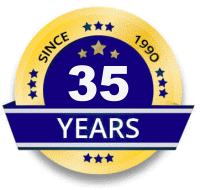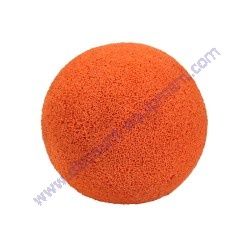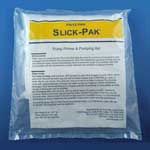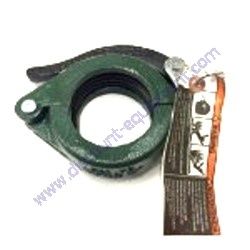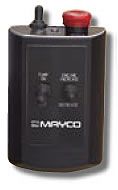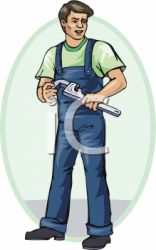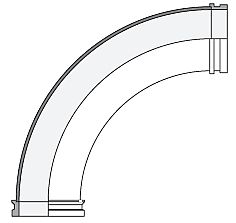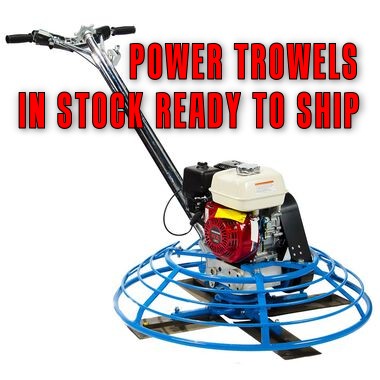Mayco / Multiquip C30HDGA Concrete Pump, Towable Ball-Valve Zenith Z416 Gamma, 45hp, Gas Engine
Safety Information
Mayco / Multiquip C30HDGA Ball-Valve Concrete Pump
GENERAL SAFETY
CAUTION
NEVER operate this equipment without proper protective clothing, shatterproof glasses, respiratory protection, hearing protection, steel-toed boots and other protective devices required by the job or city and state regulations.
NEVER operate this equipment when not feeling well due to fatigue, illness or when on medication.
NEVER operate this equipment under the influence of drugs or alcohol.
NOTICE
This equipment should only be operated by trained and qualified personnel 18 years of age and older.
Whenever necessary, replace nameplate, operation and safety decals when they become difficult read.
Manufacturer does not assume responsibility for any accident due to equipment modifications. Unauthorized equipment modification will void all warranties.
NEVER use accessories or attachments that are not recommended by Multiquip for this equipment. Damage to the equipment and/or injury to user may result.
ALWAYS know the location of the nearest fire extinguisher.
ALWAYS know the location of the nearest first aid kit.
ALWAYS know the location of the nearest phone or keep a phone on the job site. Also, know the phone numbers of the nearest ambulance, doctor and fire department.
This information will be invaluable in the case of an emergency
PUMP SAFETY
DANGER
NEVER pump volatile, explosive, flammable or low flash point fluids. These fluids could ignite or explode.
The engine fuel exhaust gases contain poisonous carbon monoxide. This gas is colorless and odorless, and can cause death if inhaled.
The engine of this equipment requires an adequate free flow of cooling air. NEVER operate this equipment in any enclosed or narrow area
where free flow of the air is restricted. If the air flow is restricted it will cause injury to people and property and serious damage to the equipment or engine.
NEVER operate the equipment in an explosive atmosphere or near combustible materials. An explosion or fi re could result causing severe bodily harm or even death.
WARNING
NEVER pump corrosive chemicals or water containing toxic substances. These fluids could create serious health and environmental hazards. Contact local
authorities for assistance.
NEVER disconnect any emergency or safety devices.
These devices are intended for operator safety. Disconnection of these devices can cause severe injury, bodily harm or even death. Disconnection of any of
these devices will void all warranties.
CAUTION
NEVER lubricate components or attempt service on a running machine.
NEVER block or restrict flow from discharge hose.
Remove kinks from discharge line before starting pump.
Operation with a blocked discharge line can cause clutch or catastrophic damage.
DO NOT operate this equipment unless the hopper grate, guards and safety devices are attached and in place.
CAUTION must be exercised while servicing this equipment. Rotating and moving parts can cause injury if contacted.
Keep hands out of the hopper when the engine is running.
NOTICE
In the winter, drain water that has accumulated in the lubrication box to prevent freezing.
ALWAYS be sure the operator is familiar with proper safety precautions and operation techniques before using pump.
Keep all inexperienced and unauthorized people away from the equipment at all times.
Before start-up, check the hopper and remove all foreign matter and debris.
DO NOT use worn or damaged hose couplings, inspect all hoses and couplings for wear. Replace any worn or defective hoses or couplings immediately.
Unauthorized equipment modifications will void all warranties.
Check all fasteners periodically for tightness. Also check towing tongue bolt, lock nut and wheel lug nuts for wear.
Test the pump’s emergency stop switch. The purpose of this test is to shut down the engine in the event of an emergency.
Multiquip strongly encourages the operator to take the safety training courses offered by the American Concrete Pumping Association (www.concretepumpers.com).
Refer to the Engine Owner’s Manual for engine technical questions or information recommended by Multiquip for this equipment. Damage to the equipment and or injury to user may result.
ALWAYS remove the ignition key when leaving the pump unattended.
ALWAYS block the wheels on the unit when using on a slope.
ALWAYS use properly rated hoses and clamps — 1,500 PSI or higher.
ALWAYS allow the pump a proper amount of time to cool before servicing.
ALWAYS keep the machine in proper running condition.
ALWAYS ensure pump is on level ground before use.
Fix damage to machine and replace any broken parts immediately.
ALWAYS store equipment properly when it is not being used. Equipment should be stored in a clean, dry location out of the reach of children and unauthorized personnel.
ENGINE SAFETY
WARNING
DO NOT place hands or fingers inside engine compartment when engine is running.
NEVER operate the engine with heat shields or guards removed.
DO NOT remove the engine oil drain plug while the engine is hot. Hot oil will gush out of the oil tank and severely scald any persons in the general area of the pump.
CAUTION
NEVER touch the hot exhaust manifold, muffler or cylinder. Allow these parts to cool before servicing equipment
NOTICE
NEVER run engine without an air filter or with a dirty air filter. Severe engine damage may occur. Service air filter frequently to prevent engine malfunction.
NEVER tamper with the factory settings of the engine or engine governor. Damage to the engine or equipment can result if operating in speed ranges above the maximum allowable.
FUEL SAFETY
DANGER
DO NOT start the engine near spilled fuel or combustible fluids. Fuel is extremely flammable and its vapors can cause an explosion if ignited.
ALWAYS refuel in a well-ventilated area, away from sparks and open flames.
ALWAYS use extreme caution when working with flammable liquids.
DO NOT fill the fuel tank while the engine is running or hot.
DO NOT overfill tank, since spilled fuel could ignite if it comes into contact with hot engine parts or sparks from the ignition system.
Store fuel in appropriate containers, in well-ventilated areas and away from sparks and flames.
NEVER use fuel as a cleaning agent.
DO NOT smoke around or near the equipment. Fire or explosion could result
from fuel vapors or if fuel is spilled on a hot engine.
To prevent leakage, tighten the fuel cap until it clicks.
Slowly open fuel cap to release pressure.
BATTERY SAFETY
DANGER
DO NOT drop the battery. There is a possibility that the battery will explode.
DO NOT expose the battery to open flames, sparks, cigarettes, etc. The battery contains combustible gases and liquids. If these gases and liquids come into contact with a flame or spark, an explosion could occur.
WARNING
ALWAYS wear safety glasses when handling the battery to avoid eye irritation.
The battery contains acids that can cause injury to the eyes and skin.
Use well-insulated gloves when picking up the battery.
ALWAYS keep the battery charged. If the battery is not charged, combustible gas will build up.
DO NOT charge battery if frozen. Battery can explode.
When frozen, warm the battery to at least 61°F (16°C).
ALWAYS recharge the battery in a well-ventilated environment to avoid the risk of a dangerous concentration of combustible gases.
If the battery liquid (dilute sulfuric acid) comes into contact with clothing or skin, rinse skin or clothing immediately with plenty of water.
If the battery liquid (dilute sulfuric acid) comes into contact with eyes, rinse eyes immediately with plenty of water and contact the nearest doctor or hospital to seek medical attention.
CAUTION
ALWAYS disconnect the NEGATIVE battery terminal before performing service on the equipment.
ALWAYS keep battery cables in good working condition. Repair or replace all worn cables.
TRANSPORTING SAFETY
CAUTION
NEVER allow any person or animal to stand underneath the equipment while lifting.
NOTICE
Before lifting, make sure that the equipment parts are not damaged and screws are not loose or missing.
ALWAYS make sure forklift forks are inserted into pockets (if applicable) as far as possible when lifting the pump.
ALWAYS shut down engine before transporting.
NEVER lift the equipment while the engine is running.
Tighten the fuel cap securely until it clicks to prevent fuel from spilling.
Use one-point suspension hook and lift straight upwards.
DO NOT lift machine to unnecessary heights.
ALWAYS tie down equipment during transport by securing the equipment with straps, rope or chains.
TOWING SAFETY
CAUTION
Check with your local county or state safety towing regulations, in addition to meeting Department of Transportation (DOT) Safety Towing Regulations, before towing your pump.
In order to reduce the possibility of an accident while transporting the pump on public roads, ALWAYS make sure the trailer that supports the pump and the towing vehicle are mechanically sound and in good operating condition.
ALWAYS shut down engine before towing.
Make sure the hitch and coupling of the towing vehicle are rated equal to or greater than the trailer gross vehicle weight rating.
ALWAYS inspect the hitch and coupling for wear. NEVER tow a trailer with defective hitches, couplings, chains, etc.
Check the tire air pressure on both towing vehicle and trailer. Trailer tires should be inflated to 80 psi cold.
Also check the tire tread wear on both vehicles.
ALWAYS make sure the trailer is equipped with a safety chain.
ALWAYS properly attach trailer’s safety chains to towing vehicle.
ALWAYS make sure the vehicle and trailer directional, backup, brake and trailer lights are connected and working properly
DOT requirements include the following:
• Connect and test electric brake operation.
• Secure portable power cables in cable tray with tie wraps.
The maximum speed for highway towing is 55 MPH unless posted otherwise. Recommended off-road towing is not to exceed 15 MPH or less depending on type of terrain
Avoid sudden stops and starts. This can cause skidding or jack-knifing. Smooth, gradual starts and stops will improve towing.
Avoid sharp turns to prevent rolling.
Trailer should be adjusted to a level position at all times when towing.
Raise and lock trailer wheel stand in up position when towing.
Place chock blocks underneath wheels to prevent rolling while parked.
Place support blocks underneath the trailer’s bumper to prevent tipping while parked.
Use the trailer’s swivel jack to adjust the trailer height to a level position while parked.
ENVIRONMENTAL SAFETY/DECOMMISSIONING
NOTICE
Decommissioning is a controlled process used to safely retire a piece of equipment that is no longer serviceable.
If the equipment poses an unacceptable and unrepairable safety risk due to wear or damage, or is no longer cost effective to maintain (beyond life-cycle reliability) and is to be decommissioned (demolition and dismantlement), be
sure to follow the rules below.
DO NOT pour waste or oil directly onto the ground, down a drain or into any water source.
Contact your country’s Department of Public Works or recycling agency in your area and arrange for proper disposal of any electrical components, waste or oil associated with this equipment.
When the life cycle of this equipment is over, remove battery and bring to appropriate facility for lead reclamation. Use safety precautions when handling batteries that contain sulfuric acid.
When the life cycle of this equipment is over, it is recommended that the frame and all other metal parts be sent to a recycling center.
Metal recycling involves the collection of metal from discarded products and its transformation into raw materials to use in manufacturing a new product.
Recyclers and manufacturers alike promote the process of recycling metal. Using a metal recycling center promotes energy cost savings.
EMISSIONS INFORMATION
NOTICE
The diesel engine used in this equipment has been designed to reduce harmful levels of carbon monoxide (CO), hydrocarbons (HC) and nitrogen oxides (NOx)
contained in diesel exhaust emissions.
This engine has been certified to meet US EPA evaporative emissions requirements in the installed configuration.
Attempting to modify or make adjustments to the engine emission system by unauthorized personnel without proper training could damage the equipment or create an unsafe condition.
Additionally, modifying the fuel system may adversely affect evaporative emissions, resulting in fines or other penalties.
Emission Control Label
The emission control label is an integral part of the emission
system and is strictly controlled by regulations.
The label must remain with the engine for its entire life.
If a replacement emission label is needed, please contact
your authorized engine distributor
|
